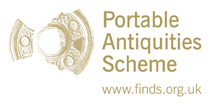File:Early Medieval, Zoomorphic Strap End, Thomas Class A, Type 2 (FindID 542099).jpg

Original file (4,346 × 5,833 pixels, file size: 3.97 MB, MIME type: image/jpeg)
Captions
Captions
Summary
[edit]| Early Medieval: Zoomorphic Strap End, Thomas Class A, Type 2 | |||
|---|---|---|---|
| Photographer |
Birmingham Museums Trust, Teresa Gilmore, 2013-01-30 11:34:35 |
||
| Title |
Early Medieval: Zoomorphic Strap End, Thomas Class A, Type 2 |
||
| Description |
English: An incomplete cast copper alloy zoomorphic strap end of Late Anglo-Saxon dating (9th Century AD).
The strap end is sub oval (rectangle with flattened ends and bowed sides) in plan. The majority of the strap end is cast as a solid piece, with the exception of the widest part of the terminal which divides, in profile, forming a 'V' shape. The leather strap would have been attached to the strap end by rivets (now missing). Both parts of the V shaped union are present, but the top is incomplete. The upper face of the strap end is decorated. The decoration is split into three parts: A central rectangular panel; an zoomorphic terminal and an upper ovoid (egg shaped) panel. It is likely that the pattern in the central rectangle is an interlaced zoomorphic pattern. The pointed terminal is decorated with an incomplete debased animal, dog or horses head. The reverse of the strap end is flat and undecorated. The strap end measures 59.04 mm in length, 11.40 mm wide and 4.30 mm thick. It weighs 7.7 g. The strap end is a dark mid brown colour, with an uneven surface patina. Abrasion, caused by movement whilst within the plough soil, has resulted in a loss of some of the original surface detail and patina. Thomas (2003, page 1) states: "Strap ends provided the dual service of preventing straps to which they were attached from fraying or curling, and on items of costume, adding weight to make them hang down attractively. One can deduce from their considerable variation in size and the fact that they were evidently worn in sets, pairs and singly, that the range current during this period encapsulated several functional contexts." The vast majority of the strap ends of this date are two dimensional or decorated with low relief designs. Late Anglo Saxon and Viking Age strap ends have been classified into several types by Thomas (2003). From the classification suggested by Thomas (2003, page 2), it is likely that this example will fit into Thomas' Class A, type 2 (Patterned style). This type encompasses a range of non-representational, curvilinear and geometric patterns, often in combination with highly stylised animal head terminals and trilobite palmettes. In terms of dating, Thomas (2003, p.2) states that the chronological limits of the class A strap ends probably lie either side of the 9th century - with some suggestion of 8th century origins and increasing evidence to 10th century usage in the north, by which time the tongue shaped (class E) examples had superseded them in the south. On this basis the strap end is likely to date from the 8th to the 10th century. Reference: Thomas, G. 2003 Late Anglo-Saxon and Viking Age strap-ends 750-1100: Part 1. Finds Research Group Datasheet 32. Finds Research Group AD700-1700. |
||
| Depicted place | (County of findspot) Staffordshire | ||
| Date | between 800 and 1000 | ||
| Accession number |
FindID: 542099 Old ref: WMID-904973 Filename: WMID-904973.jpg |
||
| Credit line |
|
||
| Source |
https://finds.org.uk/database/ajax/download/id/413912 Catalog: https://finds.org.uk/database/images/image/id/413912/recordtype/artefacts archive copy at the Wayback Machine Artefact: https://finds.org.uk/database/artefacts/record/id/542099 |
||
| Permission (Reusing this file) |
Attribution-ShareAlike License | ||
| Object location | 52° 39′ 06.48″ N, 1° 47′ 20.22″ W | View this and other nearby images on: OpenStreetMap |
|---|
Licensing
[edit]- You are free:
- to share – to copy, distribute and transmit the work
- to remix – to adapt the work
- Under the following conditions:
- attribution – You must give appropriate credit, provide a link to the license, and indicate if changes were made. You may do so in any reasonable manner, but not in any way that suggests the licensor endorses you or your use.
- share alike – If you remix, transform, or build upon the material, you must distribute your contributions under the same or compatible license as the original.
File history
Click on a date/time to view the file as it appeared at that time.
| Date/Time | Thumbnail | Dimensions | User | Comment | |
|---|---|---|---|---|---|
| current | 08:01, 31 January 2017 |  | 4,346 × 5,833 (3.97 MB) | Fæ (talk | contribs) | Portable Antiquities Scheme, WMID, FindID: 542099, early medieval, page 4242, batch count 14731 |
You cannot overwrite this file.
File usage on Commons
The following page uses this file:
Metadata
This file contains additional information such as Exif metadata which may have been added by the digital camera, scanner, or software program used to create or digitize it. If the file has been modified from its original state, some details such as the timestamp may not fully reflect those of the original file. The timestamp is only as accurate as the clock in the camera, and it may be completely wrong.
| Orientation | Normal |
|---|---|
| Horizontal resolution | 300 dpi |
| Vertical resolution | 300 dpi |
| Software used | Adobe Photoshop Elements 7.0 Windows |
| File change date and time | 12:33, 7 January 2013 |
| Color space | sRGB |
| Image width | 4,346 px |
| Image height | 5,833 px |
| Date and time of digitizing | 12:33, 7 January 2013 |
| Date metadata was last modified | 12:33, 7 January 2013 |
